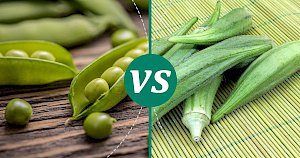Okra vs Peas: Nutrition, Calories & Protein Compared


Okra vs Peas
Nutrition Facts
Serving size:
change
5g10g15g20g30g40g50g60g80g100g120g140g160g180g200g220g250g300g350g400g450g500g600g700g800g900g1000g
1oz2oz3oz4oz5oz6oz7oz8oz10oz12oz15oz20oz25oz30oz35oz40oz50oz
Amount Per Serving:
Serving size:
change
5g10g15g20g30g40g50g60g80g100g120g140g160g180g200g220g250g300g350g400g450g500g600g700g800g900g1000g
1oz2oz3oz4oz5oz6oz7oz8oz10oz12oz15oz20oz25oz30oz35oz40oz50oz
Amount Per Serving:
Okra vs Peas 100g Compare
| per 100g | Okra | Peas |
|---|---|---|
| Calories | 33 | 81 |
| Carbohydrates | 7.5 g | 14.45 g |
| Fat | 0.1 g | 0.4 g |
| Dietary fiber | 3.8 g | 5.7 g |
| Protein | 2 g | 5.42 g |
| Calcium | 81 mg | 25 mg |
| Iron | 0.8 mg | 1.47 mg |
| Magnessium | 57 mg | 33 mg |
| Potassium | 303 mg | 244 mg |
| Sodium | 8 mg | 5 mg |
| Vitaminium A | 375 µg | 765 µg |
| Vitaminium B1 (Thiamine) | 0.2 mg | 0.266 mg |
| Vitaminium B2 (riboflavin) | 0.06 mg | 0.132 mg |
| Vitaminium B3 (Niacin) | 1 mg | 2.09 mg |
| Vitaminium B5 | 0.245 mg | 0.104 mg |
| Vitaminium B6 | 0.215 mg | 0.169 mg |
| Vitaminium B9 (Folic acid) | 88 mg | 0.065 mg |
| Vitaminium C | 21.1 mg | 40 mg |
| Vitaminium E | 0.36 mg | 0.13 mg |
| Vitaminium K | 53 µg | 0.025 µg |
| Beta karoten | 225 mg | 449 mg |
Discovering the Nutritional Gems: Okra and Peas
When it comes to enriching our diet with vegetables, okra and peas stand out for their unique flavors and health benefits. Before diving into the specifics of okra vs peas, let's explore some interesting facts about these two green wonders. Okra, often associated with comfort food in the southern United States, is not only a culinary staple in dishes like gumbo but also a powerhouse of nutrients, including vitamins A and C. Peas, on the other hand, have been a crucial part of human diet for centuries, offering a sweet taste and a burst of nutrients in every bite.
Nutritional Showdown: Okra vs Peas
Choosing between okra and peas can be a dilemma for many health-conscious individuals. Let's break down their nutritional profiles to see how they compare in terms of calories, carbs, and more.
- Calories: Okra contains 33 calories per 100 grams, making it a lower-calorie option compared to peas, which have 81 calories per 100 grams.
- Carbohydrates and Fiber: With 7.5 grams of carbs and 3.8 grams of fiber, okra is a good choice for those watching their carb intake. Peas offer 14.45 grams of carbs and 5.1 grams of fiber, making them slightly higher in both.
- Protein: Peas are a winner in the protein category with 5.42 grams, whereas okra provides 2 grams of protein.
- Vitamins and Minerals: Okra boasts higher levels of vitamins A and C, magnesium, and calcium. Peas, however, are richer in vitamin B1, B2, B3, iron, and zinc.
What Does This Mean for Your Diet?
Both okra and peas offer unique nutritional benefits. If you're aiming to reduce calorie intake, okra might be the better option for you. Its low calorie and carb content, paired with a decent amount of fiber, make it an excellent choice for weight management. On the other hand, if you're looking to boost your protein intake or need more iron and zinc in your diet, peas could be the way to go.
Moreover, the high vitamin A content in okra supports good vision and skin health, while the vitamin C found in both vegetables boosts the immune system. Peas, with their higher B-vitamin content, can help improve energy levels and overall metabolic health.
Adding Okra and Peas to Your Meals
Incorporating okra and peas into your diet can be both delicious and nutritious. Okra can be grilled, sautéed, or added to soups and stews, while peas are versatile enough to be a side dish, blended into soups, or mixed into salads. Regardless of how you choose to enjoy them, both vegetables can contribute to a balanced and healthy diet.
In conclusion, when comparing okra vs peas, it's clear that both vegetables have their own set of nutritional benefits that can cater to different dietary needs. Whether you're calorie-conscious, looking for a protein boost, or need more vitamins and minerals, incorporating these green veggies into your diet can be a step towards a healthier lifestyle.
Okra 100g
33kcalCalories source
- 77% CARBS.
- 21% PROTEIN
- 2% FAT
Peas 100g
81kcalCalories source
- 70% CARBS
- 26% PROTEIN
- 4% FAT
Compares of okra
- Okra vs Asparagus
- Okra vs Beetroot
- Okra vs Bitter Melon
- Okra vs Bok Choy
- Okra vs Broccoli
- Okra vs Brussels Sprouts
- see all compares of okra
Marcin Piotrowicz
calories-info.com creator
Healthy diet and healthy lifestyle promoter
Add comment